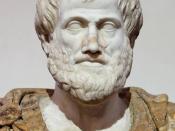Aristotle names popular sovereignty and individual liberty the two characteristic principles of democracy, and he expresses them, in language similar to that of Plato, as incompatible with the stability of the existence moral and political order: "Men think that what is just is equal; and that equality is the supremacy of the popular will; and that freedom means the doing what a man likes. In such democracies every one lives as he pleases." Popular sovereignty also is the basic principle of modern democracy; that the people ultimately rule. Four conditions are especially important: government policies reflect what the people want, people participate in the political process, high quality information and debate are available, and the majority rules. If compared modern popular sovereignty with one that was defined by Plato and Aristotle, they seem to be very the same.
Individual freedom is an important element of Aristotle's democratic principles.
The character of democracy is: "first of all, they are free. Liberty and free speech are rife everywhere: anyone is allowed to do what he likes. Every man will arrange his own manner of life to suit his pleasure. The result will be greater variety of individuals than under any other constitution." By Plato in the ideal state, the life of the guardians and auxiliaries excludes individual interests, whether in property, love, or the family. He excludes freedom of speech, an important element of liberal democracy, expressed by his anger towards artists: "Positively, the poets will be told by the rulers, what elements to stress in their stories and the limits beyond which they must not be allowed to go." That is why both of the authors observe democracy as a dangerous kind of state. Modern individual freedom includes political equality and political liberty, very important factors of a secure...


